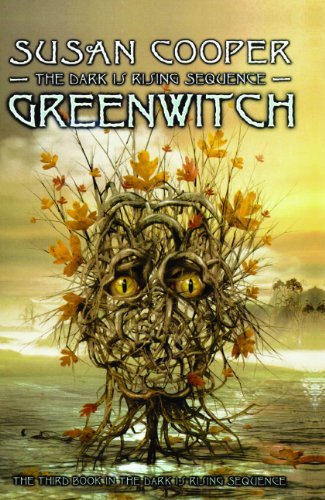Greenwitch isn’t really my favourite book of the series, though it is the one with the most mystery — I wonder a lot about the background mythology, the legends of Cornwall that the Greenwitch brings to life and what lies behind each glimpse of part of a story. It occurred to me last night while reading that maybe Susan Cooper has come closer than Tolkien to a “mythology for England”. Granted, he’s closer if you’re looking at England as “the land under the rule of the Anglo-Saxons”, but Cooper has touched on the legends of the land, the real stories that matter, rather than inventing a quest and a ring. Her quests come organically out of the mythology she’s using, and the places where she joins on her own are pretty seamless.
(Tolkien has created a world of his own, I think, and people often put too much emphasis on the “mythology for England” stuff. I don’t mean to do that: whether or not he meant to achieve that, what he achieved in the end was great. I just think the idea of a mythology for England is maybe actually achieved by Cooper.)
Greenwitch also features one of the things I love most about this series — the characters. They’re people. Simon and Barney are good-hearted boys who get jealous and possessive when another boy of a similar age seems to encroach on their time and their friends. Captain Toms, an Old One of the Light, gets laid low by gout. And I liked that the Dark is personified in a single character, this one time — not as the tide of the Dark, but as a single man of the Dark. We see hints of individuality there; his bitterness when he says “I have no friends”, his genuine artistic talent. It’s another of those moments where I think the black/white Dark/Light dichotomy cracks a little.
There are also some gorgeous passages in this book about the beauty and danger of the sea, the amoral and uncaring world of the Wild magic (and then, again, that hint of the Greenwitch as a child, as a lonely creation in need of something to hold on to, of kindness).


For some reason this is actually one of my favorites of the series. I think part of is it the focus on Jane and how this is her adventure in a sense. Her connection with the Greenwitch may be one of the reasons this is one of my favorites because sometimes the smallest bits of kindness can lead to the most amazing things.
And I really do think you are onto these books as this being a sort of mythology for England.
I completely agree about that. This is Jane’s book — and following my theme of pointing out the bits that break the simple dichotomy, we see that she’s kind in a way the Light is not and cannot be; they’d be sunk without her.
It just occurred to me while reading and now I feel like I could write essays on it!
The light definitely values the human side of things and how they break the stalemate of the light and the dark. After all in The Dark is Rising, it is a human who lets in the Dark and in Sliver on the Tree it is John Rowlands’ decision that everything hinges on.
I would definitely not mind seeing essays on this topic XD
Exactly. They *know* that they’re limited to “cold absolute good”, and they have always worked with humans for that (while protecting those humans, in most cases except Hawkin’s, where he ran some risk). I don’t really like it when people claim that TDIR is morally simplistic, because I think the layers *are* there. It’s simplistic on a level that appeals to young children, but there’s more there if you do read it as a layered book.
Hahaha, watch this space…
On 23 December 2013 17:48, Bibliophibian Inc.